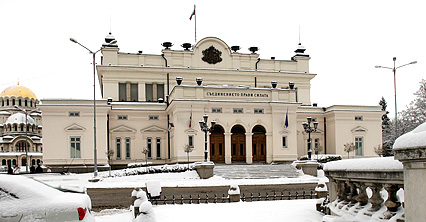
Parliament adopted at second reading the bill for creation of the Bulgarian Agency for Food Safety. The Agency will assess the quality of food products and weather they comply with the national standards, developed and approved by the branch organizations and the competent authorities. The Agency will monitor all food products with the exception of bottled natural mineral, spring and table waters. The control of the latter will be exercised by the regional health inspection services of the Ministry of Health. The act envisions that the Minister of Agriculture and Food, respectively of Health will establish national reference laboratories for testing food and mineral water.
The Agency for Food Safety will maintain national registers containing data of approved food processing plants at national and regional level. The registers are published at the website of the Agency. Deputies decided that within a month after the law goes into effect there will be an overhaul and restructuring of all the agencies concerned so far with the functions of the newly created food safety agency. The accredited laboratories will continue to operate under the previous order until the issuance of a new certificate of accreditation. The Chief Veterinary Sanitary Inspector is appointed by the Executive Director of the BAFS. In order to carry out the activities under the law the agency shall collect various fees. The Food Safety Agency becomes legal successor of the assets, liabilities, records, rights and obligations of the National Veterinary Service, the National Plant Protection Service and partly of the National Grain and Fodder Service, of the regional health inspection services and the regional directorates "Agriculture". The Bulgarian Agency for Food Safety is a second level spending unit to the Minister of Agriculture.
With the final adoption of amendments to the Foreigners in Bulgaria Act the National Assembly gave the start of the so called “Blue card” which will allow highly skilled foreign workers to enter, stay and reside in Bulgaria. The “Blue card” of the European Union is very much like the “Green card” issued by the U.S. Foreign nationals can obtain the EU Blue Card if they hold a visa to stay in Bulgaria and are highly skilled workers stipulates the law. The residence permit of the EU Blue Card is issued upon authorization by the Ministry of Labour and Social Policy initially for one year. The permit can be renewed. The family members of a blue card holder can also obtain a residence permit. Foreigners can reside in Bulgaria for a short period of up to 90 days and this period may be extended once; for a period of up to 1 year; and for a long period with an initial authorized period of five years, renewable; and permanently or indefinitely. Long-term residence status is granted to a person who has resided legally and continuously in the country in the last five years before submitting the application for long-term residence permit. After that the status becomes permanent if no reasons to withheld the permanent residence occur. In order to be granted long-term residence, the foreigner must provide evidence that he and his family members possess sufficient means of subsistence allowing them to live without social assistance. The amount of funds could not be less than the minimum monthly wage or pension. The foreigner must demonstrate that he has health insurance for the residence duration. A residence permit can be issued on humanitarian grounds. The amendments introduce rules for family reunification for foreigners residing in Bulgaria and for withdrawal of residence permits issued in the country. The law envisages revocation of the residence permit in case of fake marriages or adoptions aiming at circumventing the rules.
The members of parliament ratified the Agreement between Bulgaria and Austria for avoidance of double income and assets taxation.
The National Assembly adopted at first reading the bill on Restriction of Cash Payments in the country to up to BGN 5000.

- 22/04/2021
The Parliament imposed a moratorium on concessions, real estate deals and appointments pending the election of a new cabinet or caretaker government - 16/04/2021
By 156 votes “in favour”, the National Assembly accepted the resignation of the Council of Ministers with Prime Minister Boyko Borisov - 15/04/2021
Speech by Mrs. Iva Miteva upon her election as a President of the 45th National Assembly - 15/04/2021
The Member of Parliament Iva Miteva was elected President of the 45th National Assembly - 15/04/2021
The Members of the 45th National Assembly were officially sworn in - 03/03/2021
The President of the National Assembly Tsveta Karayancheva and MPs attended the solemn fireworks-retreat on the occasion of the Liberation of Bulgaria - 03/03/2021
Every Bulgarian should preserve and honour the memory of those glorious ancestors, thanks to whom Bulgaria exists today, said the President of the National Assembly Tsveta Karayancheva in Gabrovo - 03/03/2021
Today we are on Shipka to pay our respects to all the heroes who sacrificed their lives for freedom, said the President of the National Assembly Tsveta Karayancheva after climbing Shipka Peak together with young people from all over the country - 02/03/2021
The Vice-President of the National Assembly Valeri Simeonov received an award from the Bulgarian Republican Self-Government in Hungary - 26/02/2021
The Parliament adopted at second reading amendments to the Measures Against Money Laundering Act
 Български
Български English
English